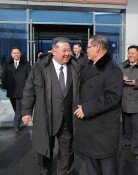[Editorial] A Much Needed Agreement With India
[Editorial] A Much Needed Agreement With India
Posted August. 07, 2009 08:19,
Korea will sign today a comprehensive economic partnership agreement with India, a big achievement for Korea since India is one of the four emerging economies known as BRIC (Brazil, Russia, India and China) that have driven global economic growth. If the agreement takes effect in January next year as scheduled, Korea will take a step closer to the worlds fourth-largest economy and the second most populous country of 1.2 billion people. India will also become Koreas sixth free trade partner, and given its deal under negotiation with the European Union, Korea could conclude similar agreements with other major economies.
Despite the global economic crisis, India is expected to see growth of 6.5 percent this year and 5.4 percent next year. The EU and Japan are also negotiating free trade deals with India, and China is considering doing the same. Koreas agreement with India ahead of other major economies is in line with Seouls strategy of pursuing sustainable growth through being a more open economy. Korea can also strengthen its global position since India has emphasized promoting the interests of developing nations.
The Korea-India agreement is relatively weaker in the level and pace of market opening. If both countries lower tariffs on imports from each other, Korea will greatly benefit since India has long imposed a hefty tax on imported goods. Indias tariff on car parts, a major Korean export, will be lowered from 12.5 percent to one to five percent over the next eight years. Korean and Indian professional workers can also work in each other`s countries. Thus, many Indian computer programmers, management consultants, assistant teachers of English, and scientists can enter Korea from next year. The two sides can also mutually benefit by investing into each others manufacturing sectors.
Heavily dependent on trade and investment, Korea has lamented being stuck between advanced and rapidly growing emerging economies. Complaints cannot bring advancement and growth, however. Signing free trade deals with major economies is good for strengthening domestic competitiveness. Korea in 2003 lagged far behind other nations in free trade after it signed its first free trade agreement with Chile. Since then, however, Korea has made vast strides in that department, concluding six of 11 agreements under negotiation. With protectionism rearing its ugly head again in the world, Korea must accelerate efforts to expand free trade. Competition to sign such agreements has intensified, with 120 of 230 deals under negotiation being signed since 2000.
Nevertheless, the Korean National Assembly should ratify the deal with India when it reviews the agreement next month. Numerous efforts were needed to present the Korea-U.S. free trade accord to the Korean parliament, but ratification has not come due to groundless resistance from opposition parties. Dereliction of duty by lawmakers has prevented Korea from conducting an industrial reshuffle, which is considered a benefit of free trade. Economic losses resulting from lawmakers not doing their jobs will incur a heavy price on Koreans.




![[이진영 칼럼]잘난 韓, 못난 尹, 이상한 張](https://dimg.donga.com/c/138/175/90/1/wps/NEWS/IMAGE/2026/01/20/133198367.1.jpg)


